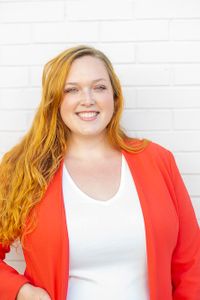Jillian Riley
Elections and appointments
Education
Personal
Contact
Jillian Riley ran for election to the Durham Soil and Water Conservation District Supervisor in North Carolina. She lost in the general election on November 3, 2020.
Riley completed Ballotpedia's Candidate Connection survey in 2020. Click here to read the survey answers.
Biography
Jillian Riley was born in Norman, Oklahoma. She received a bachelor's degree from St. Olaf College in 2014 and, as of the 2020 election, anticipated receiving a master's degree from the University of North Carolina, Chapel Hill, in 2021. Riley's professional experience includes working for the Sierra Club and as an associate supervisor in the Durham Soil and Water Conservation District.[1]
Elections
2020
See also: Municipal elections in Durham County, North Carolina (2020)
General election
Endorsements
To view Riley's endorsements in the 2020 election, please click here.
2020
Ballotpedia survey responses
See also: Ballotpedia's Candidate Connection
Jillian Riley completed Ballotpedia's Candidate Connection survey in 2020. The survey questions appear in bold and are followed by Riley's responses.
Expand all | Collapse all
I've been an environmental justice activist for over a decade. When I was 15 years old, I started supporting small farmers, as a way to stand up against factory farms. I've worked on the coast of NC repairing hurricane-damaged homes. And I've been in the fight against big fossil fuel polluter, Duke Energy; but the fight for environmental justice isn't over. Right now, Durham doesn't have an elected official with a background in environmental justice. As an activist, I know how crucial it is to have an advocate at the local level. As your Board Supervisor, I will be that elected official who advocates for environmental justice. My grandad grew up on an oil rig camp during the 1940s and his father, my great-grandad, died of an accident on the rigs due to poor labor practices. My grandad spent his childhood hunting squirrels for food but eventually climbed out of poverty by working in the big oil and fracked gas business. Now we know the irreversible damages that come with this work. I began working as an environmental justice organizer at the age of 15 as a way to pay homage to my grandad's childhood and as a form of reparations for the damage he contributed as an adult. Most recently, I worked for the Sierra Club and partnered with communities all across the state to fight for clean water, clean air, renewable energy, and successfully forced Duke Energy to clean up toxic coal ash. Lastly, I am an Associate Supervisor on the SWCD.
- SUSTAINABILITY IN SCHOOLS: Put money back in schools through environmental conservation projects that can save up to $15,000 annually.
- INNOVATION IN AGRICULTURE: Industrial hemp is the future! It is an innovative economic opportunity and I'll make sure that all farmers have the tools needed to start their new business ventures and build momentum towards marijuana legalization, an important criminal justice reform initiative.
- PROTECT CLEAN WATER: I have worked with communities across the state to advocate for clean water through protests and speaking at statewide meetings held by the Department of Environmental Quality and the Utilities Commission. As a candidate, I have proudly signed the No Toxic Money Pledge.
The top cost-share and grant programs are the Community Conservation Assistance Program, Agricultural Cost-Share Assistance Program, Agricultural Economic Development Grant Program, and Ag Water Resources Assistance Program. To apply for these programs, an applicant must know which staff person to call to set up an in-person assessment before they officially apply. This process is not transparent. Many farmers do not know how to apply, and it can feel like an insider's game. As an organizer, I have the skills to build relationships and outreach to farmers. I've spoken with farmers who did not know we provide grant assistance. I have spoken with a current Board Supervisor about updating the website to create a tab for grant information, including an online form so farmers can easily begin the application process. These adjustments will be a huge step in making sure the Durham SWCD programs are transparent and equitable. I will work with the staff to make these changes in a realistic and socially conscious manner.
This office is the environmental board of Durham. It's an incredibly important office that, unfortunately, many people still do not know about. SWCD works to conserve, enhance and promote the natural resources of Durham County by providing technical assistance, environmental education information, and economic incentives to County citizens and by exhibiting a diversified program to meet its changing needs. Their vision is to address all natural resources on every acre in Durham County in a way that will benefit the environment, wildlife, its people, and the natural resources themselves, plus produce an environmentally conscious group of citizens who will set a trend of conserving, enhancing and promoting our natural resource base.
My parents are some of the greatest examples of leadership and passion. I grew up with a traditional conservative father and a progressive liberal mother. And unlike any sane family, we talked politics every day. By the time I was in middle school our family had attended every church in town, but ended up spending Sunday mornings listening to a news anchor rather than a pastor. I sat on the couch and listened to my parents articulately debate over the newscaster about current events from each of their contrasting viewpoints. I was raised with what my mother calls a "social consciousness." She is a social worker with a PhD who has taught me to think not just about the world around me, but challenges me to think about how I can positively contribute to it. I was about 7 years old when I attended my first protest. We stood on the street corner of our local KFC holding homemade signs calling out the company's poor animal treatment. My father on the other hand, has taught me of perseverance and hard work. As a man with only a high school diploma, he works long hours at a job he only half enjoys in order to provide for a family he deeply loves. With his support, I led my third grade class to vote for George W. Bush in our class election, a memory I now laugh over. Through their guidance, I had many unique, and sometimes even contradicting, experiences. I am grateful for the values and perspectives my parents, both Mom and Dad, instilled in me.
Community engagement is more than just a box to check, it's a call to action. I believe that you can tell a lot about a candidate by how well they work to engage the community during their campaign. That's why I canvass the Durham Farmer's Market for 3 hours every weekend, make phone calls every Sunday, and have a robust online presence. We cannot canvass door-to-door due to COVID-19, but our team is working hard to engage with voters in as many safe ways as possible.
I am a very solutions focused person who works hard to engage community in the decision making process. I've often been called the "idea girl" since I'm able to creativley conseptualize many solutions to a probelm.
Besides the top 4 responsibilities previously listed, I'd say the most important job is simply listening and responding to the community. The programs of SWCD are all voluntary based, meaning everyone must apply or opt-into using our services. Adjusting our programs to better meet community conservation and environmental needs are crucial to this role. In order to receive the greatest environmental impact we must make sure our programs are accessible and desired by those in the community.
I would like to help end corporate pollution in the state of North Carolina and beyond.
Harry Potter will always be my favorite book. As a child my mama would read them to me (with a British accent) before going to bed. This is a tradition I hope to pass on to my kids one day.
Winnie the Pooh was my childhood character and my little sister was Piglet. Those two would get into some fun trouble, just like my sister and I do still!
One struggle has been dietary issues. I was diagnosed with celiac disease a couple of years ago after being actively sick for 5 years. In those 5 years I saw 5 different doctors who all ignored me and my symptoms. I had just about given up and decided to live with the pain when I was encourage to give it one last try. I learned to advocate for myself and not take no for an answer. Thankfully, I found a doctor who listened to me. After requesting a endosopy and bacteria procedure, they discovered I had celiac as well as a rare bateria that was causing all of my pain. In order to receive the proper medication for the bacterial infection I had to fight with my insurance. After months of fighting, my insurance still refused to pay for the best medication and I was left with taking the only brand they would pay for. This mediaction was more intrusive and could have caused other health effects. I have since been much better, but am still struggling with dietary issues. I am not fully healed and am always advocating with my doctor and insurance compay to find solutions to my dietary issues. This is just one example of the way insurance companies do not have the customer's best intentions in mind. There are so many people that have more serious conditions who struggle to get the best medications. We need medicare for all!
Board Supervisors have 4 main responsibilities: 1. Protect Natural Resources by implementing bet management practices to protect and improve Durham's environment; 2. Build Partnerships with government, nonprofits, and businesses for technical and financial support; 3. Approve Local Projects for all financial assistance projects presented by the staf; 4. Support Communities through environmental education, park projects, and easements. After speaking with 13+ people involved with Soil and Water in some capacity, I believe my skill sets of environmental justice organizing, advocacy, relationship building, and hard work will complement the work of the Durham SWCD.
I believe it is important for elected officials to have experience working with county staff. For example, I currently serve on the Durham City/County Citizen's Advisory board and work with staff to review federal HUD grants to address homelessness and affordable housing issues in Durham. Understanding the inner workings of county government has helped prepare me for this new role in supporting SWCD staff.
This office requires a great deal of collaboration across county lines and with the state government. Many SWCD's are not functioning at high levels of efficiency and many counties struggle to get the seats filled. Additionally, state funding is critical for program operations, but in order to receive proper funding District Supervisors need to advocate with their state representatives; and with empty SWCD seats throughout the county, this leads to less funding statewide. The skills needed to increase county participation and state funding are those of a community organizer. Building coalitions, identifying leaders, and advocacy are all skills needed to both strengthen the Durham SWCD and also Districts throughout the state.
Note: Ballotpedia reserves the right to edit Candidate Connection survey responses. Any edits made by Ballotpedia will be clearly marked with [brackets] for the public. If the candidate disagrees with an edit, he or she may request the full removal of the survey response from Ballotpedia.org. Ballotpedia does not edit or correct typographical errors unless the candidate's campaign requests it.
See also
External links
- ↑ Information submitted to Ballotpedia through the Candidate Connection survey on September 10, 2020







 = candidate completed the Ballotpedia Candidate Connection survey.
= candidate completed the Ballotpedia Candidate Connection survey.









